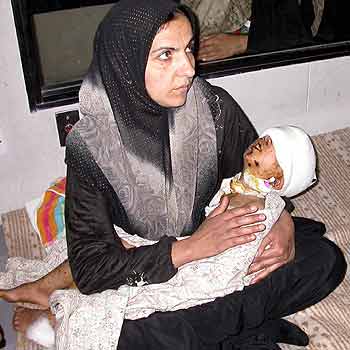Viva Jody Williams, and down with cluster bombs
 This is Jody Williams. She's won a Nobel Peace Prize for her work against landmines. She is good news.
This is Jody Williams. She's won a Nobel Peace Prize for her work against landmines. She is good news.She's in Lima, Peru this week for an international conference on cluster munitions. Cluster munitions (often referred to as cluster bombs) are a hellish weapon, and what they lack in precision they make up for in ruthless destruction. The U.S. dropped them in Afghanistan and Iraq. Lebanon dropped them on Israel. Israel dropped them (pummeled might be the better analogy) on Lebanon.
Why are they so deadly? Because they don't work. Literally, that's the answer. When cluster bombs are dropped, they spread smaller submunitions over an indiscriminate area. Some of these submunitions blow up on contact with the ground (often killing civilians, because it's very hard to pinpoint their trajectory). However, more often than not, submunitions don't detonate on contact with the ground, and instead get lodged in trees, on the side of hills, in grassy fields, inside gardens, stuck on power lines, and more. They sit, and they sit, and they sit.
Until a farmer runs one over with his tractor.
Or until a child thinks it's a toy and picks it up.
Until a car runs over one on the side of the road.
You get the picture. Which, speaking of pictures, here's just one shot of a cluster bomb victim.
 This is why these weapons should be banned.
This is why these weapons should be banned.This is where Jody Williams comes into play. At the international conference in Lima, Peru, Jody joined four other Nobel Peace Prize Laureates (all women, by the way), calling for a complete and total ban on cluster munitions. Joining Jody Williams were Mairead Corrigan Maguire (she won the prize in 1976 for her work in Northern Ireland...on a personal note, she's also entirely cool and one of the sweetest people I've ever met); Wangari Maathai (who won in 2004 for her work planting trees in Kenya); Shirin Ebadi (who won in 2003 for her work in Iran); and Rigoberta Manchu (who won in 1992 for her work in Guatemala). All five women told it like it is: "Cluster bombs have become synonymous with civilian casualties."
Cluster bombs are like landmines, in that they leave indiscriminate destruction in their wake. Landmines have been banned (thank you, Jody Willams). It's time to ban cluster bombs, too.
For more information, visit the Stop Cluster Munitions site.


1 Comments:
How could the US use cluster munitions?? How? I know we stopped being the good guys long about when Roosevelt arranged for those naval ships to be in Pearl Harbor before the attacks he knew were coming, but cluster munitions? That's so hideous I think it goes beyond belief. At least you are doing something about it by publicizing it. Thank you.
Love the writing on your blog, BTW!
By BroderWriter, at 12:41 PM
BroderWriter, at 12:41 PM
Post a Comment
<< Home